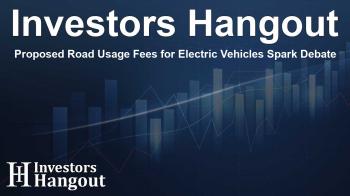Proposed Road Usage Fees for Electric Vehicles Spark Debate

Proposed Road Usage Fees for Electric Vehicles Spark Debate
In an engaging discussion surrounding the future of transportation, the nominee to lead the U.S. Transportation Department has brought attention to an important issue regarding electric vehicles (EVs).
Why Should Electric Vehicles Contribute?
The conversation pivots on the notion that traditional vehicles contribute to road maintenance through fuel taxes, specifically on diesel and gasoline repairs, which electric vehicles do not pay. Sean Duffy, who previously served as a Republican lawmaker, expressed his views in a recent confirmation hearing.
The Challenge Ahead
Duffy highlighted the need for electric vehicles to also contribute to the upkeep of the roads they utilize. He remarked, "They should pay for use of our roads. How to do that, I think, is a little more challenging." This statement opens a broader discussion about equitable infrastructure funding.
Importance of Fair Contribution
The implications of EV road usage fees extend beyond just taxes. It touches on fairness for those who own conventional vehicles and pay into the system through fuel consumption. Electric vehicles, while they offer environmental benefits, also put wear and tear on public roads.
Possible Solutions
As the conversation unfolds, various solutions are being considered to implement a fee structure for electric vehicles. This could involve a mileage-based fee or a flat annual charge. Such initiatives would not only promote fairness but also ensure sustained funding for necessary road repairs and improvements.
The Road Ahead for Transportation Policy
As the nominee progresses through the confirmation process, the dialog on how to finance transportation is likely to evolve. Establishing a framework that accounts for the changes in vehicle technology is essential for meeting future infrastructure needs.
Continued Advocacy and Awareness
Public awareness and advocacy will play a pivotal role in shaping this policy. As electric vehicles become more prevalent, understanding their impact on road funding will be critical. Engaging with communities and stakeholders will further ensure that any proposed fees are beneficial and just.
Frequently Asked Questions
What prompted the discussion about EV fees?
The conversation began during a Senate hearing for the nominee to the Transportation Department, emphasizing the need for EVs to contribute to road repairs.
How do traditional vehicles contribute to road maintenance?
Traditional vehicles pay fuel taxes through diesel and gasoline, which help fund road repairs at a federal level.
What challenges are mentioned about implementing EV fees?
Implementing a fee structure for EVs is considered challenging, as proposed solutions need careful consideration to maintain fairness.
Why is it important for EVs to contribute?
It ensures fairness among vehicle owners and provides necessary funding for road repairs and infrastructure development.
What are the possible solutions for EV road fees?
Potential solutions include a mileage-based fee or a flat annual charge to support road maintenance funding.
About Investors Hangout
Investors Hangout is a leading online stock forum for financial discussion and learning, offering a wide range of free tools and resources. It draws in traders of all levels, who exchange market knowledge, investigate trading tactics, and keep an eye on industry developments in real time. Featuring financial articles, stock message boards, quotes, charts, company profiles, and live news updates. Through cooperative learning and a wealth of informational resources, it helps users from novices creating their first portfolios to experts honing their techniques. Join Investors Hangout today: https://investorshangout.com/
Disclaimer: The content of this article is solely for general informational purposes only; it does not represent legal, financial, or investment advice. Investors Hangout does not offer financial advice; the author is not a licensed financial advisor. Consult a qualified advisor before making any financial or investment decisions based on this article. The author's interpretation of publicly available data presented here; as a result, they should not be taken as advice to purchase, sell, or hold any securities mentioned or any other investments. If any of the material offered here is inaccurate, please contact us for corrections.
